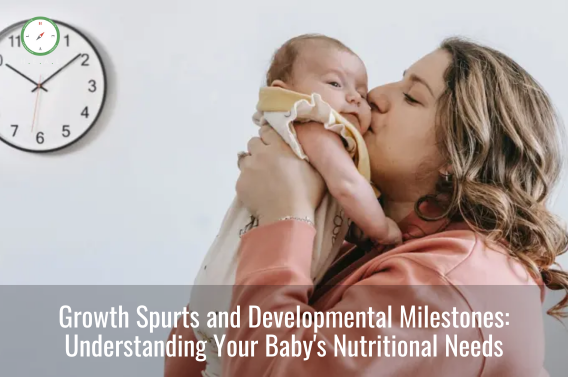As parents, witnessing the rapid growth and developmental milestones of our babies is a thrilling and rewarding experience. However, with growth spurts come increased nutritional demands, making it crucial to understand and meet your baby's evolving dietary needs. In this article, we'll delve into the intricacies of infant nutrition and growth spurts and developmental milestones, and explore how nutrition plays a pivotal role in supporting your baby's healthy growth and development.

Growth spurts are periods during infancy when babies experience rapid physical growth and development. These spurts typically occur at various intervals throughout the first year of life and may continue into toddlerhood. While growth spurts are a normal part of development, they can sometimes leave parents feeling puzzled or concerned about their baby's increased appetite and fussiness.
During growth spurts, babies may exhibit signs such as increased hunger, more frequent feedings, restless sleep, and clinginess. These behaviours often coincide with developmental leaps, such as learning to roll over, sit up, crawl, or walk. Parents need to recognize these cues and respond by providing the extra nourishment and comfort that their growing baby needs.
During growth spurts, a child's body undergoes rapid and significant changes. These periods are characterized by accelerated growth in height and weight, as well as changes in body composition. Physiologically, growth spurts are driven by hormonal changes, particularly an increase in growth hormone and other growth factors. This results in the elongation of bones, leading to height gain. Alongside skeletal growth, muscles also develop, contributing to increased strength and coordination. However, growth spurts can be accompanied by temporary discomfort or clumsiness as the body adjusts to its changing proportions. Additionally, increased appetite and energy requirements are common during these periods as the body needs extra nutrients to support growth. Overall, growth spurts are a normal part of childhood development, signalling important milestones in physical maturation.
Proper nutrition is essential during periods of rapid growth and development. During the primary stage of infant nutrition and growth, Breast milk or formula remains the introductory source of nutrition in their first year of life. Breast milk, in particular, is uniquely tailored to meet a baby's nutritional requirements, providing the perfect balance of nutrients, antibodies, and immune-boosting properties.

For breastfeeding mothers, it's crucial to maintain a healthy diet and stay hydrated to support optimal milk production. Offering frequent nursing sessions during growth spurts helps ensure that your baby receives the extra calories and nutrients needed for growth.
For formula-fed infants, it's essential to follow feeding guidelines provided by healthcare professionals and formula manufacturers. Choosing an appropriate formula that matches your baby's age and nutritional needs is key to supporting healthy growth and development.
As babies transition to solid foods around six months of age, introducing nutrient-rich foods becomes increasingly important. Offer a variety of fruits, vegetables, whole grains, lean proteins, and healthy fats to provide essential vitamins, minerals, and antioxidants. Incorporating foods rich in iron, calcium, vitamin D, and omega-3 fatty acids promotes bone health, brain development, and overall growth.
Pay attention to your baby's cues and preferences, gradually introducing new foods while continuing to breastfeed or formula-feed as the primary source of nutrition. As your baby's palate expands, encourage self-feeding and exploration of different textures and flavours.
Regular visits to your paediatrician or nutritional counsellor are crucial for monitoring your baby's growth and development. These check-ups allow healthcare professionals to track your baby's weight, length, and head circumference, ensuring that they are meeting their perfect infant nutrition and growth milestones.

If you have concerns about your baby's growth or nutritional intake, don't hesitate to seek guidance from your healthcare provider. They can offer personalized recommendations and support to address any issues or challenges you may encounter along the way.
In conclusion, understanding your baby's nutritional needs during growth spurts and developmental milestones is essential for supporting their healthy growth and development. By providing adequate nourishment, responsive feeding, and nutrient-rich foods, you can help your baby thrive during these exciting stages of infancy. Remember to trust your instincts as a parent and seek guidance from healthcare professionals whenever needed. With the right approach, you can lay a solid foundation for your baby's lifelong health and well-being.
Famous health transformational coach Vidhi Beri has a wide range of experience in lactation and nutritional counselling of infants and toddlers, dietary and nutritional counselling for fertility treatment and has shared many valuable tips with the new mother. She is also working with a focus on Movement, Nutrition and Mindfulness practices for weight control and improvement of overall health and disease reversal. For more details kindly visit the official website http://www.vidhiberi.com/